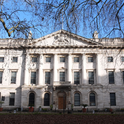Now that (nearly) everyone finally acknowledges that the climate emergency is real, eco-friendliness has become quite the fashion. And just as no fashionable outfit is complete without somebody trying to fake its likeness, the trend for companies to pretend to be more green than they actually are—aka “greenwashing”—is growing.
In the shops myriad products are labelled “eco-friendly,” “natural” or “biodegradable” with no explanation. Fast fashion brands market themselves as “sustainable” on the basis of having one organic product line. Firms burnish their environmental credentials for simply meeting their legal obligations. Even Ryanair, a big carbon emitter, called itself “Europe’s lowest emissions airline,” until it was sanctioned by the Advertising Standards Authority, while ClientEarth, the campaigning environmental lawyers, recently catalogued how the world’s largest fossil fuel companies use advertising to greenwash the environmental harm their businesses inflict.
This may seem a trivial issue compared with the huge changes needed to avoid a climate apocalypse. But it’s more important than that. Effective greenwashing has the power to lull governments into complacency about their climate policies: the assumption being that polluting industries such as energy, aviation and construction are sincerely making the innovations needed to hit climate targets. At its most egregious, it diverts crucial funding away from true innovators to those dissembling. And increasingly sophisticated methods can fool even the best informed.
Rob Harrison of Ethical Consumer, told me about a panel he sat on along with top climate scientists: “Even they were genuinely confused by green claims in the electricity sector!” Arguments are complex and technical, with the worst offenders disproportionately well resourced and able to argue their case convincingly.
“Lately, there’s a new type of greenwashing—some call it ‘net-zero-washing,’” Jeanne Martin, senior campaign manager for Share Action, the campaigning group that helps shareholders to lobby their companies to behave more responsibly, told me. This is when high-carbon companies (or governments) set ambitious net-zero emission targets but, once the applause dies down, do not undertake the measurable short-term goals needed to meet them. Even net zero isn’t as good as it sounds: often to achieve the figure it relies on future benefits—like as-yet-undeveloped technology or tree-planting—to compensate for emissions today. Campaign groups such as Friends of the Earth have wryly pointed out that there isn’t enough land available in the world to meet current tree-planting pledges. Some companies target “beyond net zero.” Maria van der Heide, Share Action’s head of EU policy, said it was increasingly difficult to devise rules that don’t effectively let such dazzling claims off the hook: “The challenge is to ensure there isn’t greenwashing in anti-greenwashing legislation.”
That’s why a raft of politicians, regulators, lawyers, activists and investors are grappling with the question—how do you stop companies making unverifiable environmental claims? Greenwashing works because of nebulous definitions. A number of interested parties told me they likened “sustainable” to the phrase “world peace”—unopposable, unachievable, meaningless.
Some countries are taking the issue seriously. In April, France announced one of the world’s first laws against greenwashing, which could see organisations fined and forced into public corrections if found guilty of false or misleading claims. And the European Union is outlining rules to stop businesses making such claims, by publishing a list of rules—its so-called green taxonomy—as part of a series of environmental investment regulations aiming to hit climate boasters where it hurts: in their pockets.
The taxonomy is designed to hold accountable climate-friendly funds—a sector showing “phenomenal growth with no signs of abating,” according to Andy Pettit, director of EMEA policy research at Morningstar. The investment research firm found that sustainable funds attracted all-time high inflows of 120bn euros in the first quarter of this year. These funds must now be categorised—based on the new EU specifications—as Dark Green (with sustainable investment as an objective), Light Green (that merely promotes sustainability), or Grey (which does little or nothing.)
“Everybody’s calling themselves sustainable—it’s difficult to pinpoint who’s for real,” said Marcus Björksten, whose Fondita Sustainable Europe invests in companies addressing environmental problems—such as wind power or waste management. “But now you have to prove it. Companies dropping to Grey will struggle to attract capital.”
International bodies are also looking at regulating another rider on the green bandwagon. Green bonds, issued by governments and companies to fund new and existing projects with environmental benefits such as low-carbon transport, are growing exponentially. The UK is about to issue its first green bonds and the EU will use them to fund nearly a third of its post-pandemic recovery. Without strict metrics, things can slip through. A 2017 500m euro green bond by Spanish oil and gas company Repsol turned out, to the surprise of many, to be for improving existing fossil fuel refineries.
The dangers of failing to drive the right green investment were highlighted when Fatih Birol, executive director of the International Energy Agency (IEA), warned in May that emissions would notch up their second biggest recorded rise, largely due to increased coal use as countries, especially in Asia, tried to boost their economies as they came out of lockdown. Exploitation and development of new oil and gas fields should stop this year, argues Birol, and no new coal-fired power stations should be built in order for the world to stay within safe global heating limits. Birol said the technologies required have already been invented, just not developed, and called for global investment in energy to more than double to five trillion dollars annually.
“There is money out there—every day we are spending trillions of pounds,” Dutch Green MEP Bas Eickhout, vice-chair of the European Parliament’s environment committee, told me. “How can we divert that money so it’s contributing to the transition to a clean economy?”
Some investors have got the message: HSBC and Chevron are among those facing shareholder pressure on climate issues. Norwegian asset manager Storebrand dumped its stocks in some of the world’s largest oil and mining companies, including Rio Tinto and ExxonMobil, for their lobbying against climate goals.
One question is whether companies will come to heel without the force of the law. ClientEarth believes not. It has become a trailblazer against efforts to push through climate-damaging projects. Their victories include a 2019 case against a planned Polish coal-fired power plant. Other landmark wins by environmental groups and citizens include the Dutch, Irish and German governments being forced to revise “inadequate” climate pledges. Currently, five US states and the district of Columbia are suing the oil industry for greenwashing.
All eyes are now on what could be a gamechanging case. Peruvian farmer Saul Luciano Lliuya is suing Germany’s largest energy producer, RWE, for contributing to climate change and thus being partly responsible for melting mountain glaciers near his home, which he alleges has harmed his livelihood. But it’s notoriously difficult to link pollution-related damage to a specific cause. Lawyers often have to resort to convoluted manoeuvres. The environmental NGO Germanwatch had to buy a minority share in RWE and take Luciano Lliuya’s case to Germany. In Volkswagen’s infamous “dieselgate” scandal, lawyers had to prove a “loss” to the consumer, rather than simply sanctioning the carmaker for emitting up to 40 times the EU’s legal nitrogen dioxide limits.
Gareth Pope, who leads the legal team at Slater and Gordon representing around 70,000 of the 90,000 English and Welsh claimants against VW, would prefer US-style criminal proceedings against company directors. But he acknowledges that the reputational damage suffered by Volkswagen Group, plus the £26bn-plus bill for successful worldwide class actions, set a strong precedent. “They’ve spent billions trying to regain trust. In the end they had to reinvent themselves as an electric car company.”
When I consult Caroline May, chair of the Law Society Climate Change Working Group, she is more hopeful than ever. Greenwashing environmental statements with “nice pictures of hedges, then macho business as usual” are gone. If a manufacturer’s supply chain takes 40 years to develop, then it’s good business to plan for future climate rules, May said. “If your answer to all this is that you can’t afford to change, then you won’t have a business.”
At the same time, the pandemic exposed the dichotomy between saving the economy and saving humanity as false. What’s the point of money if we are dead/flooded/have no liveable spaces?
Proper regulation is already provoking a backlash. Plans for higher carbon fuel taxes sparked the 2018 Yellow Vests protests in France. Now a new wide-ranging French environmental bill—curbing airport expansion and creating the new offence of “ecocide”—has been so watered down after business lobbying that protesters say France will miss its Paris climate targets. The EU taxonomy has itself being described as “greenwashing,” since it doesn’t yet cover thorny issues including gas, nuclear, agriculture, forestry and biofuels.
Dutch Green MEP Bas Eickhout welcomes criticism. Policy is still weak, time is tight and unambitious politicians won’t act without enormous pressure. “Unfortunately, policymakers are only really up for change once they hit their head against the wall. Even though they were warned: “There is a wall. You will hit it. It will hurt.’”












